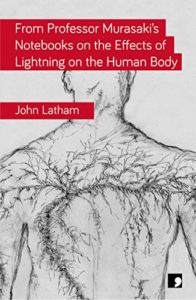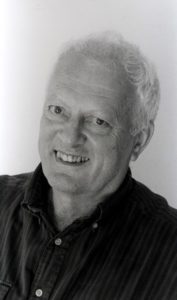John Latham is a research scientist, specializing in cloud formation. He’s received several medals from the Royal Meteorological Society, founded the Atmospheric Physics Research Group at the University of Manchester, and served as a senior research fellow at the National Center for Atmospheric Research in Colorado.
He is also a poet and novelist. His latest poetry collection, From Professor Murasaki’s Notebooks on the Effects of Lightning on the Human Body, may win the prize for the most unusual poetry title. It’s a title with a scientific sense; it almost sounds like the title of a research paper published in Nature. And the first few poems in the collection suggest a scientific theme—poems with titles about lightning, the chemistry of fog, and the forms and qualities of ice.
But that’s not where Latham goes. Where he does go is to the familiar territory of relationships. It’s a journey marked by a practiced eye, an intense gaze, and a sensitive understanding.
The subject for a portrait watches as the artist becomes increasingly dissatisfied with what she’s painting, and perhaps realizing the dissatisfaction is with him. A lover wonders who he is in the mind of the woman beside him. Two runners run alone, passing each other, a metaphor for a relationship. An aging couple dance, and discover their youth again.
Indian Summer

Baggy pants, worn slippers,
shirt with faded blue-grey squares, he’s
lurching to some music
which no-one else can hear
whose frayed edges whisper:
Enough! I’ve had enough. Yet,
his reeling has a clumsy grace
a shadow-waltz of stunted trees,
drunken barges singing.
Leaning to the mirror, his eyes
grow thirsty, huge. Angling back,
they wraith away. He sees what,
when she said it, he did not believe,
that he is beautiful, despite
his breathlessness, the tightness
in his head, his jaundiced skin.
He spins, though his loose heart
threatens to break free, She,
gliding from the silence, aches
into his eyes, aches into his eyes
until she sees he cannot stop.
So she joins him in the dance,
they whirl deep into green
touch everywhere before the drum.

John Latham
The poems are personal and often convey a sense of urgency, as in “Valedictory,” in which a professor who’s had a stroke is preparing himself to renew his lectures. In the poem “Odd One Out,” a boy begins to experience the excitement of a campout with friends but has to be taken home because of his fear. And in “Two Telegrams,” a telegram announcing a war casualty in 1944 is contrasted with one from a former girlfriend in 1961 marking the death of a relationship.
A native of Liverpool, Latham has published six collections of poetry, including All-Clear, Unpacking Mr. Jones, From the Other Side of the Street, The Unbearable Weight of Mercury, and Sailor Boy. He’s also published a novel, Ditch-Crawl (2006); short stories, and radio plays broadcast on the BBC. The title poem in this new collection received second prize in the UK National Poetry Competition in 2006.
Latham writes with a simplicity that pulls you into the poem, and, once it has you, won’t let go. The poems of From Professor Murasaki’s Notebooks on the Effects of Lightning on the Human Body linger in the mind, and in the heart, long after the reading is done.
Photo by Marlis Borger, Creative Commons, via Flickr. Post by Glynn Young, author of the novels Dancing Priest and A Light Shining, and Poetry at Work.
__________________________

“I require all our incoming poetry students—in the MFA I direct—to buy and read this book.”
—Jeanetta Calhoun Mish
- Longfellow’s “Paul Revere’s Ride”: Creating a National Legend - April 17, 2025
- Poets and Poems: Katie Kalisz and “Flu Season” - April 15, 2025
- Poets and Poems: Michelle Ortega and “When You Ask Me, Why Paris?” - April 10, 2025

Maureen says
Great title.
Bethany R. says
I like the title too, Maureen. And I keep thinking of that phrase, “aches into his eyes.”